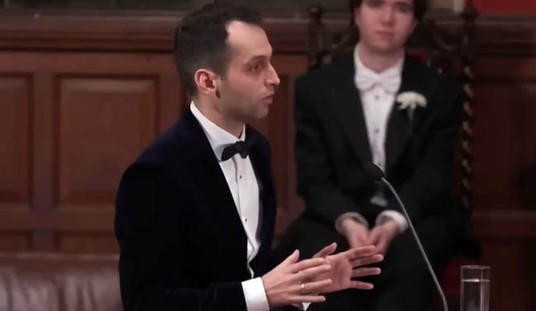Normally, a Republican conference brings out a veritable army of protesters, but the SRLC in New Orleans disappoints on that score. Perhaps the French Quarter Festival that’s taking place now made travel a little too difficult, or maybe the Left has enough problems of their own with the Democrats. In any case, the only protesters I’ve seen here at the SRLC were this small band of sign bearers from Amnesty International on our way out of the conference yesterday evening:

That was all of them, and they were slightly less enthusiastic than this picture suggests. One of our passengers in the van opened the door to engage them and asked them if sex was a human right, to which they shouted “Yes!” Maybe they’d like to explain how that works when one can’t find a partner f0r that kind of activity, but that would presume that they understand the concept of human rights at all. Since they’re arguing that health care and housing are “rights,” I doubt they would grasp the dilemma.
Heck, at least they weren’t out there supporting “defensive jihad” by terrorist networks. They need to check in with the home office more often, I suppose.
Just in case any of these benighted youngsters check in at Hot Air, here’s my rebuttal to their jejune protest sloganeering and a crash course in actual human rights, from my AIP column of last year.
Rights and Wrongs
The current health-care debate may produce some of the best civics lessons given in the United States for several decades – if we can get the media to challenge one of the underlying assumptions of government-run health-care advocates. It’s a sound bite we hear repeatedly from supporters of Obama’s health-care reform proposal, and one we sometimes hear from its opponents when they try to sound reasonable. The UN even got into the act with a declaration not long ago, insisting that health care was a basic human right.
It may sound harsh, and it may sound “unreasonable,” but health care is not a right, at least in the terms understood in the American experience. In fact, the insistence that health care is a right contradicts the basic fabric of liberty: property rights.
To start, let’s take another look at the founding documents of the US to get a sense of what “rights” meant to those who formed the nation. From the first moments of independence, the founders focused on the “unalienable rights” of free men: “life, liberty, and the pursuit of happiness.” The only other right mentioned specifically in the Declaration of Independence is the right to overthrow any government that does not respect those unalienable rights.
In the Constitution, the founders returned to clarify what specific rights the Creator had endowed for men and women. It is not an accident that the very first mention of a “right” in that document comes not in the Bill of Rights concerning the relationship of government to its citizens, but in acknowledging the crucial role of property rights in liberty. In Article I, Section 8, the founders provided Congress the power to create an environment for creativity and industrial impulse by “securing for limited Times to Authors and Inventors the exclusive Right to their respective Writings and Discoveries.”
This gave Americans the right to control and profit from their own intellect, treating their works as individual property that the nascent nation would protect to help build a prosperous America. Instead of being a subject who had a sovereign lord who would demand tribute or even receive in some cases a royal monopoly restricting trade and goods, Americans would own their own property and prosper from its use.
The Bill of Rights also followed a pattern, which was to lift the innate, natural rights of citizens above the power of government. The rights in those first ten amendments again flowed from the concept of natural law, which flow from the individual and not from the society in which the individual lives. The rights to speech, assembly, privacy, petition for redress of grievances, to keep and bear arms, and so on come from the individual himself as a consequence of his humanity – and require no gift or confiscation from government.
Note that the founders did not add a right to health care, or to food, or shelter, or even water in this bill. Why? Each of those items existed in those days, obviously, and were just as critical to life and happiness as they are today. However, to grant a right to food, as an example, would directly contradict the idea that the farmer who grows the food has a right to ownership of the fruits of his labors – literally speaking, in this instance. It sets in motion a confiscatory requirement to satisfy that right. Someone has to seize that food and distribute it to others in order to bring that “right” to fruition.
Rights cannot be confiscatory in a society that respects the individual right to property. That’s why none of the enumerated rights in the Constitution involve confiscation. Americans have the right to free speech, but they do not have the right to demand publication in a newspaper, nor do they have the right to demand that other people listen when they speak. The right to free expression of religion does not involve occupying someone else’s church and using it to your own ends. You have the right to keep and bear arms, but you do not have the right to demand free or publicly financed weaponry. All of those examples involve confiscating someone else’s property or services, whether done through the government or by force individually.
That brings us to the notion of the “right” to health care. As human beings, we want to see people succeed to the point where they can feed, clothe, and care for themselves independently, as that establishes true personal freedom. However, none of us have the right to confiscate the services of a doctor or nurse without their consent, and without their ability to set a price for their time and expertise. We don’t have the right to walk into a grocery story to demand apples when we’re hungry, either, although we should have access to the market without bias when we can properly compensate its owner for the goods.
Arguing that we have a right to health-care goods and services disconnected from our individual ability to provide that compensation takes us down a much different path than that envisioned by the founders. It owes much more to schools of thought where private property rights have little or no meaning, where the individual gets subsumed by the society in which he lives, and where all property belongs to the people as a whole. We have seen massive experimentation with those systems in the 20th century, and they had several points in common: they resulted in a sharp decline in individual liberty, in production, and in standards of living.
The founders understood that property rights would secure liberty and the greatest good for the nation as a whole. That’s why they declared the “pursuit of happiness” as an unalienable right, and not the end result of happiness itself. They knew that creating a government that respects private property and the innate rights of individuals over their government would create the best opportunities to achieve happiness for the largest amount of people. The 20th century proved them correct, for those who paid attention.









Join the conversation as a VIP Member